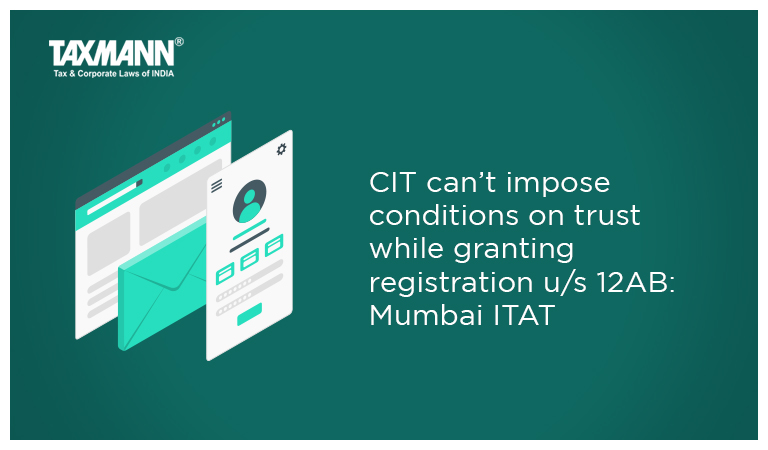CIT can’t impose conditions on trust while granting registration u/s 12AB: Mumbai ITAT
- News|Blog|Income Tax|
- 2 Min Read
- By Taxmann
- |
- Last Updated on 4 August, 2022

Case Details: Bai Navajbai Tata Zoroastrian Girls School v. CIT - [2022] 141 taxmann.com 62 (Mumbai-Trib.)
Judiciary and Counsel Details
-
- Pramod Kumar, Vice-President & Aby T Varkey, Judicial Member
- Atul Suraiya for the Assessee.
- Dr Mahesh Akhade for the Revenue.
Facts of the Case
The instant appeal was filed by the assessee against the order of the Commissioner of Income-tax (CIT) granting registration under section 12AB. The CIT had granted registration to the assessee subject to fulfillment of certain conditions and registration is liable to be withdrawn if violated any condition prescribed.
The grievance of the assessee was the CIT erred in imposing conditions based on which the registration was granted. There is no provision under the Income Tax Act which permits the CIT to grant conditional registration.
ITAT Held
The Mumbai Tribunal held that on a perusal of conditions subject to which the registration was granted, it was found that these conditions were with respect to the conduct of the trust and the circumstances in which the registration was granted to the assessee can be canceled.
These are the matters which are regulated by the specific provisions of law, and the observations of the Commissioner cannot have the independent force of law no matter how well intended.
While looking at the scheme of Section 12AB, there is a limited role that the CIT could have played under section 12AB(1).
It was open to him to call for such documents or information from the trust or institution as he thinks necessary to satisfy himself about the genuineness of trust activities. Thereafter he may proceed to take a call on whether to grant the registration under section 12A or not.
Further, there are specific provisions of law that govern the cancellation of registration, and these provisions can neither be diluted nor supplemented by the learned Commissioner. It is not for CIT to decide at the point of time of granting registration as to when and how should cancellation of registration be made.
Disclaimer: The content/information published on the website is only for general information of the user and shall not be construed as legal advice. While the Taxmann has exercised reasonable efforts to ensure the veracity of information/content published, Taxmann shall be under no liability in any manner whatsoever for incorrect information, if any.

Taxmann Publications has a dedicated in-house Research & Editorial Team. This team consists of a team of Chartered Accountants, Company Secretaries, and Lawyers. This team works under the guidance and supervision of editor-in-chief Mr Rakesh Bhargava.
The Research and Editorial Team is responsible for developing reliable and accurate content for the readers. The team follows the six-sigma approach to achieve the benchmark of zero error in its publications and research platforms. The team ensures that the following publication guidelines are thoroughly followed while developing the content:
- The statutory material is obtained only from the authorized and reliable sources
- All the latest developments in the judicial and legislative fields are covered
- Prepare the analytical write-ups on current, controversial, and important issues to help the readers to understand the concept and its implications
- Every content published by Taxmann is complete, accurate and lucid
- All evidence-based statements are supported with proper reference to Section, Circular No., Notification No. or citations
- The golden rules of grammar, style and consistency are thoroughly followed
- Font and size that’s easy to read and remain consistent across all imprint and digital publications are applied



 CA | CS | CMA
CA | CS | CMA
